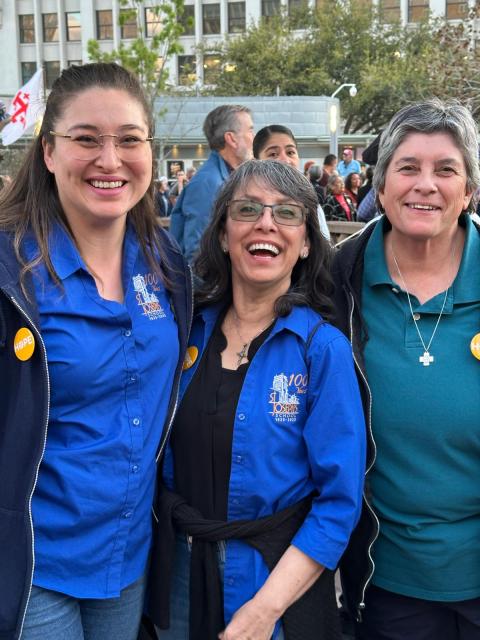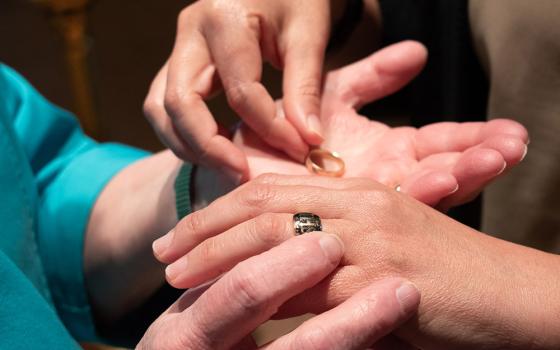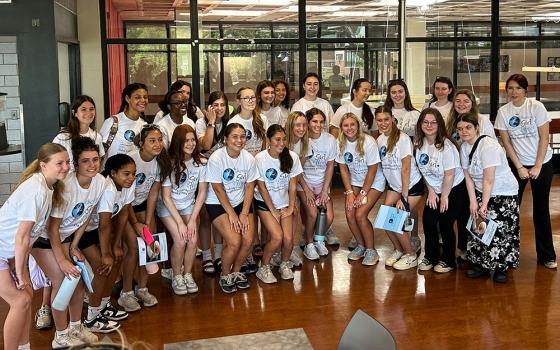
Elia Cardenas, a lay Dominican, third from left, with Sr. Graciela Muñoz and other lay people participate in a march and vigil on March 21 in El Paso, Texas, supporting the dignity of immigrants. Cardenas said the protest is a response to the criminalization of immigrants by the Texas government. (Courtesy of Elia Cardenas)
Editor's note: Global Sisters Report's new series,"Welcoming the Stranger" takes a closer look at women religious working with immigrants and migrants. While we cover this topic often, this series will feature sisters and organizations networking to better serve those crossing borders, global migration trends and the topic of the issue of immigration in the upcoming U.S. presidential election.
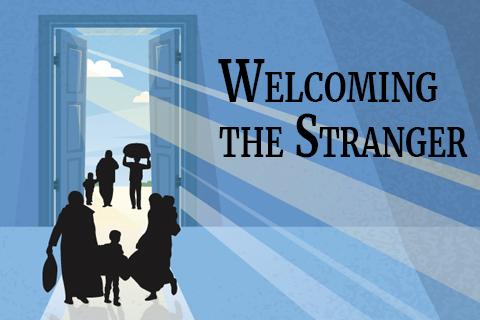
Living along the border between the United States and Mexico is a unique experience, because while people have lived on both sides of the border for ages, the border has moved.
In our border town, for example, some people were born in the U.S., while others migrated from the Mexican side. For some, it was the dividing line that moved and placed them in a different country that was not even their choice.
Today, families are separated by an iron wall where there once was an invisible line. This barrier is a symbol that treats people on the other side of the border, on the Mexican side, as undesirable and as a danger to the well-being of U.S. citizens.
In 2016, during Donald Trump's presidential campaign, Pope Francis said that building walls, a slogan of the former candidate, was not Christian, and three years later, in 2019, he affirmed — on the eve of a trip to Morocco — that those who build walls become prisoners of the walls they put up.
'Although the [U.S.-Mexico] wall is a symbol of division, the people of our border have not allowed it to become a barrier to help the migrants who are coming to our country.'
—Elia Cardenas
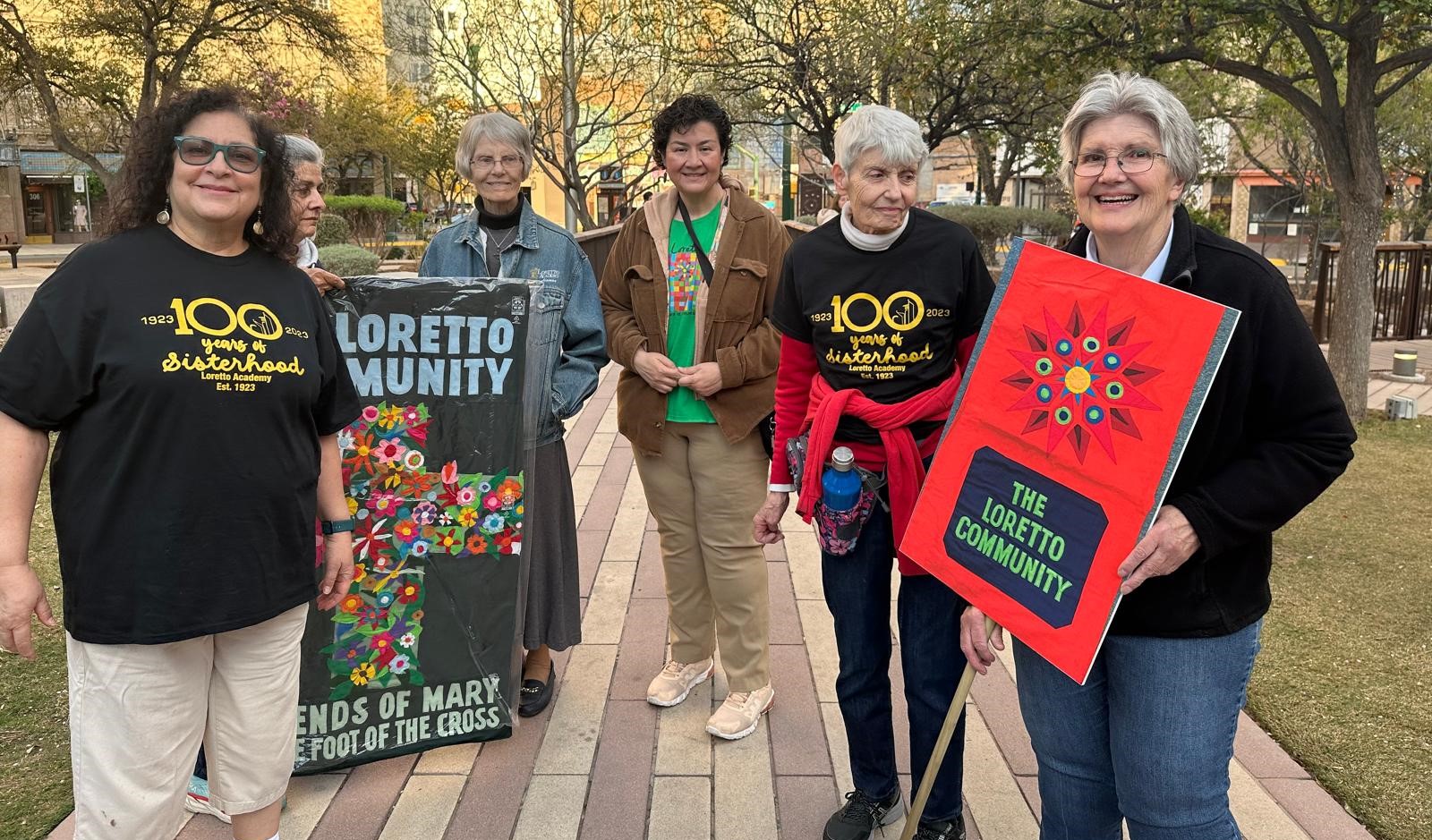
Sisters of Loretto arrive at a March 21 march to defend the dignity of migrants. (Courtesy of Elia Cardenas)
However, even though the wall is a symbol of division, the people of our border have not allowed it to become a barrier to helping the migrants who are coming to our country. In 2016, as the exodus of migrants from Central and South America surged, the parish hall at St. Mark's Church became a migrant hospitality shelter. Since then, the Migrant Shelters' Ministry has been significant in my life.
I can identify with migrants because, like them, I once sought better opportunities for my family when I migrated from Mexico. This journey towards a better life sparked within me a process of profound reflection on the global community and the fundamental right to migrate.
The ministry of migrant hospitality becomes meaningful by welcoming strangers and providing them with shelter and food. This allows those who are now our brothers and sisters to continue their journey in search of better opportunities for themselves and their families, or at least to get a temporary job to help those who stayed behind in their country of origin.
Unfortunately, our current unjust immigration policies, as well as political campaigns, use language that causes the country to fear migration, labeling migrants as criminals who are invading our country. This contradicts our church's teaching on human dignity and the value of every person.
The Texas state government, with its immoral policies, intends to make it a crime to carry out God's mission and seeks to nip migrant aid in the bud and treat them as criminals.
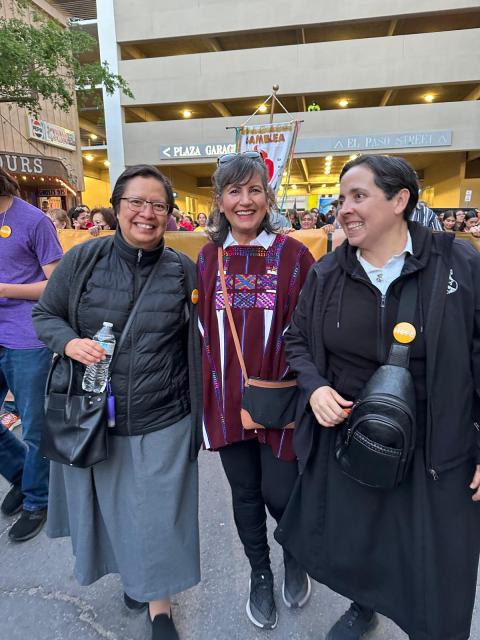
Elia Cardenas, a lay Dominican, center, marches with Dominican Srs. Gabriela Duran, right, and Gabriela Ramirez. Sisters from different congregations participated in the protest. (Courtesy of Elia Cardenas)
In the border city of El Paso, Texas, all migrant hospitality shelters are connected to Annunciation House, a nonprofit organization incorporated in our diocese. Earlier this year, Texas Attorney General Ken Paxton attempted to shut down the shelters, sending emissaries to demand the immediate release of records of migrants received, accusing them of operating as a safe house and facilitating human trafficking.
The Texas state government, with its immoral policies, seeks to make it a crime to carry out God's mission by targeting aid to migrants and treating them as criminals. In addition, the U.S. Supreme Court upheld the state's enforcement of Senate Bill 4, known as SB 4, which grants police the authority to detain individuals deemed suspicious based on their profile.
In response to these unjust measures, on March 21, our El Paso community stood in solidarity and organized a march and vigil for human dignity. Our bishops, clergy, interfaith and community leaders, as well as sisters from different congregations, joined together. The joy and peace exhibited by the sisters is a testament to their commitment to translate love into action, overcoming present challenges and bringing about change to build a more hospitable border.
On that day I arrived at the march after doing mission work at the Holy Family shelter, where I prepared quesadillas and served caldito de pollo (Mexican chicken soup). Before leaving, I informed our guests that I was leaving early because I was going to the march and they responded with a "thank you." The march was livestreamed. Unfortunately some anonymous individuals posted racist and violent comments on social media, such as "send them home and take care of them" and "what a large mafia." Despite these disheartening remarks, our faith community remained undeterred, standing united in response to the humanitarian crisis affecting our border.
Our beloved Pope Francis urges us to "care for the vulnerable" and implores all nations to embrace a "generous openness" in fostering a culture of abundance and interconnectedness. But what should we do when laws hinder our ability to do so? The resounding message from our community, echoed through a march and vigil for dignity and human rights, was "Do not be afraid."

